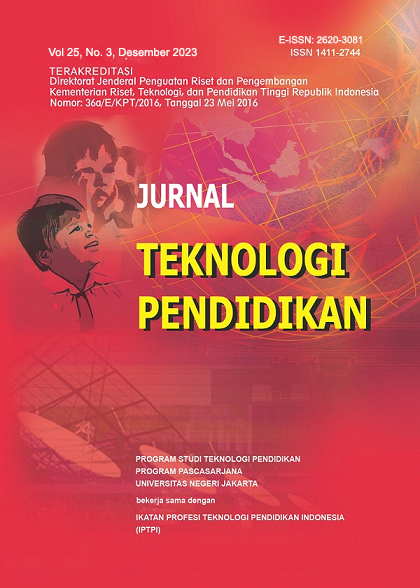Game-Based Learning and Children’s Digital Literacy to Support Pervasive Learning: A Systematic Reviews
DOI:
https://doi.org/10.21009/jtp.v25i3.38388Keywords:
Children, Game-based, Pervasive, PRISMAAbstract
In this study, we investigate the impact of game-based learning on children's digital literacy in processing and acquiring information, focusing on the generation of digital natives who excel in responding to multimedia information. Utilizing data mining and the PRISMA Protocol, we conducted a systematic review based on the keywords 'Game-based learning on children’s digital literacy.' Data from the years 2017 to 2019, extracted from Sagepub and Emerald databases, reveal strong empirical support for the enhancement of children's digital literacy, particularly through game-based learning interventions, as evidenced by a significant effect size of 0.66. This translates to children becoming better at deciphering visual cues, understanding audio narratives, and critically evaluating the information presented in a variety of multimedia formats. Furthermore, game-based learning fosters critical thinking and problem-solving skills, keeping children engaged and motivated to learn in this dynamic digital landscape.
References
Elimelech, Adi, and Dorit Aram. 2019. “A Digital Early Spelling Game: The Role of Auditory and Visual Support.” AERA Open 5(2):2332858419857702. doi: 10.1177/2332858419857702.
Francis, Jessica, Travis Kadylak, Taj. W. Makki, R. V Rikard, and Shelia R. Cotten. 2018. “Catalyst to Connection: When Technical Difficulties Lead to Social Support for Older Adults.” American Behavioral Scientist 62(9):1167–85. doi: 10.1177/0002764218773829.
Gillen, Julia, Jackie Marsh, J. Bus, T. Castro, M. Dardanou, P. Duncan, J. Enriquez-Gibson, Rosie Flewitt, C. Gray, and D. Holloway. 2018. “Digital Literacy and Young Children: Towards Better Understandings of the Benefits and Challenges of Digital Technologies in Homes and Early Years Settings.”
Gonick, By Lev S. 2015. New Media and Learning in the 21st Century. Vol. 41.
Harrison, Eugene, and Marianne McTavish. 2018. “‘I’Babies: Infants’ and Toddlers’ Emergent Language and Literacy in a Digital Culture of IDevices.” Journal of Early Childhood Literacy 18(2):163–88. doi: 10.1177/1468798416653175.
Harshavardhan, Vignesh, David Wilson D, and Mallika Vijaya Kumar. 2019. “Humour Discourse in Internet Memes: An Aid in ESL Classrooms.” Asia Pacific Media Educator 29(1):41–53. doi: 10.1177/1326365X19842023.
Maureen, Irena Y., Hans van der Meij, and Ton de Jong. 2018. “Supporting Literacy and Digital Literacy Development in Early Childhood Education Using Storytelling Activities.” International Journal of Early Childhood 50(3):371–89. doi: 10.1007/s13158-018-0230-z.
Notten, Natascha, and Birgit Becker. 2017. “Early Home Literacy and Adolescents’ Online Reading Behavior in Comparative Perspective.” International Journal of Comparative Sociology 58(6):475–93. doi: 10.1177/0020715217735362.
Sefton-Green, Julian, Jackie Marsh, Ola Erstad, and Rosie Flewitt. 2016. “Establishing a Research Agenda for the Digital Literacy Practices of Young Children.” A White Paper for COST Action IS1410.
Suhana, Mildayani. 2018. “Influence of Gadget Usage on Children’s Social-Emotional Development.” 169(Icece 2017):224–27. doi: 10.2991/icece-17.2018.58.
Tran, Yune. 2019. “Computational Thinking Equity in Elementary Classrooms: What Third-Grade Students Know and Can Do.” Journal of Educational Computing Research 57(1):3–31. doi: 10.1177/0735633117743918.
Tsai, Fu-Hsing. 2017. “An Investigation of Gender Differences in a Game-Based Learning Environment with Different Game Modes.” Eurasia Journal of Mathematics Science and Technology Education 13(7):3209–26.
Vélez, Alicia Peñalva, Juan José Leiva Olivencia, and Itziar Irazabal Zuazua. 2017. “The Role of Adults in Children Digital Literacy.” Procedia-Social and Behavioral Sciences 237:887–92.
Downloads
Published
How to Cite
Issue
Section
License
Jurnal Teknologi Pendidikan is an Open Access Journal. The authors who publish the manuscript in Jurnal Teknologi Pendidikan agree to the following terms.
Attribution-ShareAlike 4.0 International (CC BY-SA 4.0)
-
Attribution — You must give appropriate credit, provide a link to the license, and indicate if changes were made. You may do so in any reasonable manner, but not in any way that suggests the licensor endorses you or your use.
-
ShareAlike — If you remix, transform, or build upon the material, you must distribute your contributions under the same license as the original.
- No additional restrictions — You may not apply legal terms or technological measures that legally restrict others from doing anything the license permits.
Notices:
- You do not have to comply with the license for elements of the material in the public domain or where your use is permitted by an applicable exception or limitation.
- No warranties are given. The license may not give you all of the permissions necessary for your intended use. For example, other rights such as publicity, privacy, or moral rights may limit how you use the material.








